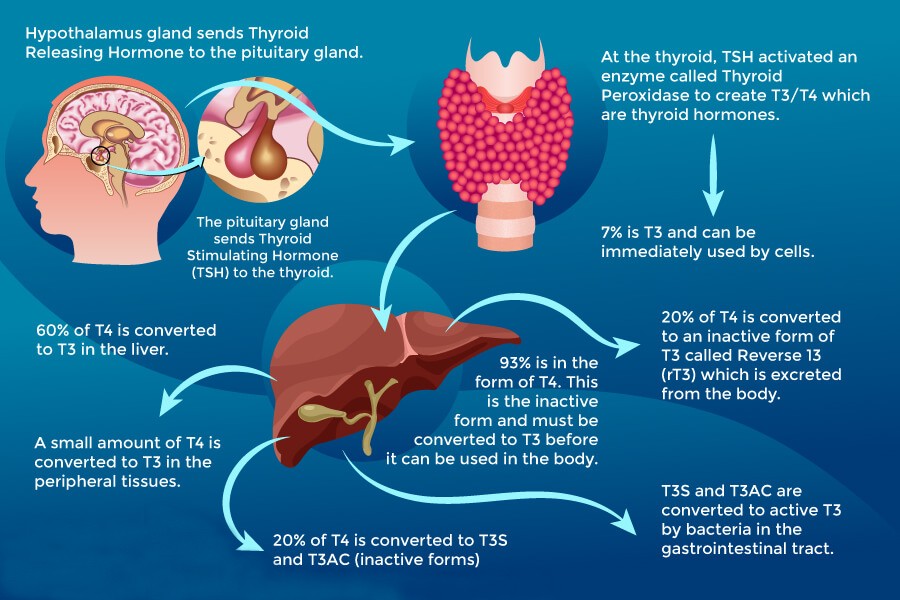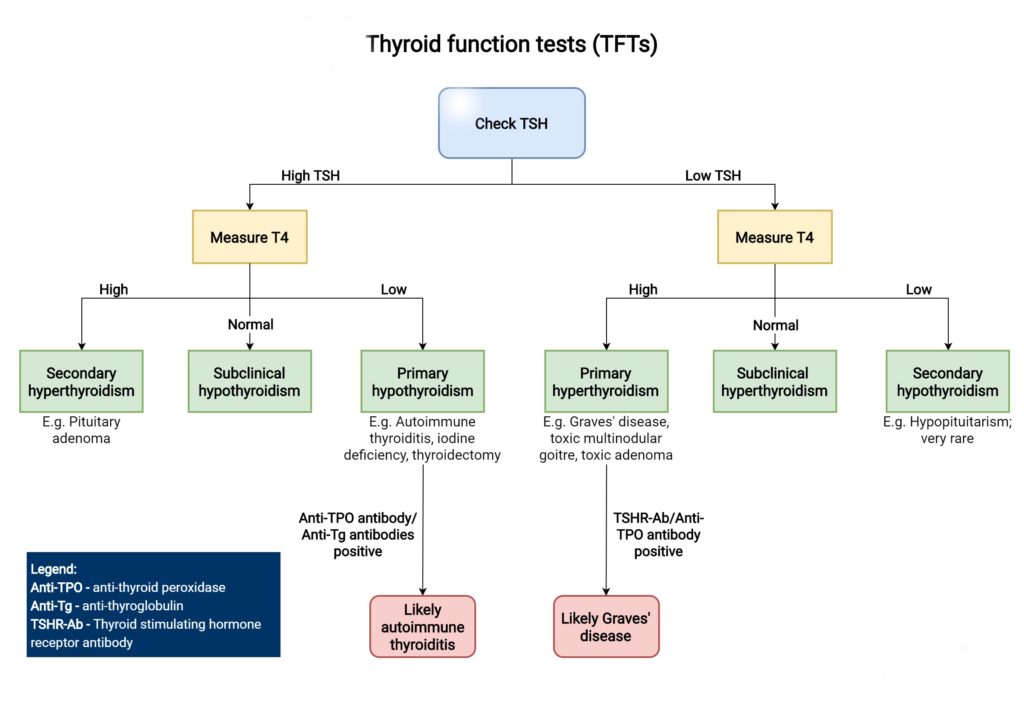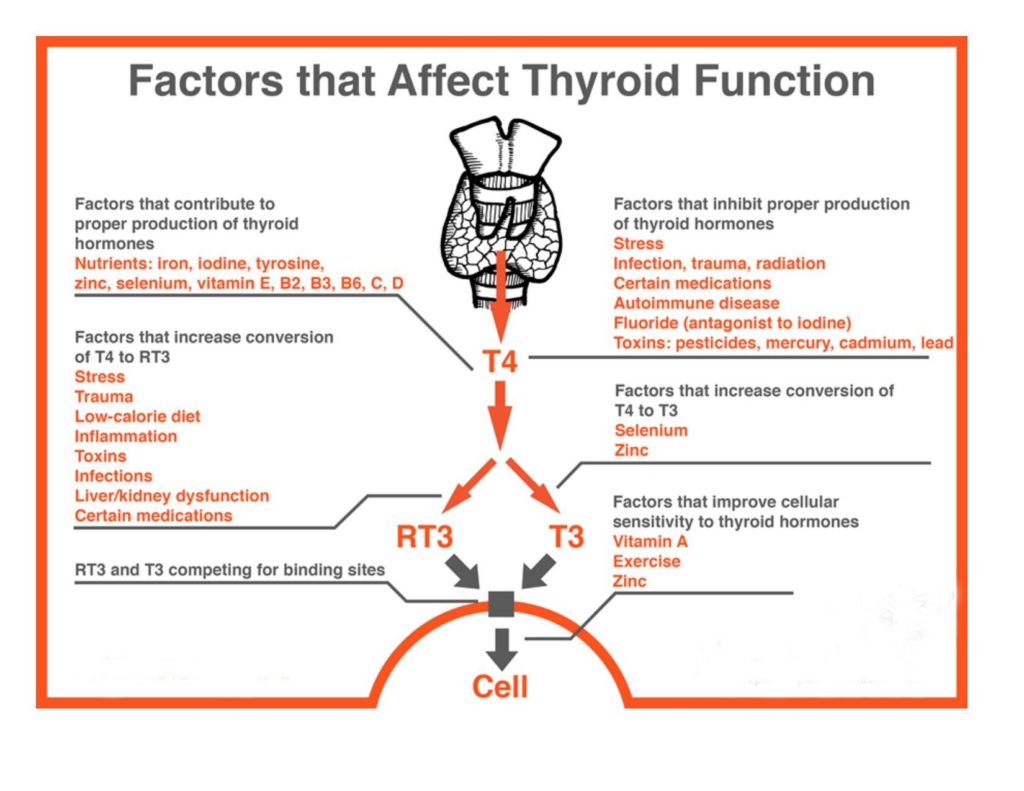
The thyroid, a butterfly-shaped gland in the neck, can have a dramatic impact on a huge variety of bodily functions.
The thyroid gland is part and parcel of the endocrine system, which is a collection of glands that produce all-important hormones responsible for metabolism, growth, sexual function, sleep, and mood.
Located above Adam’s apple, your thyroid produces thyroid-stimulating hormone (TSH), which regulates, among other things, your body’s temperature, metabolism, and heartbeat. Things can start to go wrong when your thyroid is under-or over-active.
If you have hypothyroidism (a sluggish thyroid), your TSH levels will be high, as your body is trying to stimulate more thyroid hormone activity. If you have hyperthyroidism (an overactive thyroid), your TSH levels will be low, as your body is trying to stop excessive thyroid hormone production.
It could be due to genetics, an autoimmune attack, pregnancy, stress, nutritional deficiencies, poor liver detox, or toxins in the environment. Thyroid hormones touch every aspect of the body – from the brain to bowels – so diagnosing this disorder can be challenging.
Thyroid disorders are complicated, fickle, and highly individual – meaning thyroid issues are going to look very different for each person.
Thyroid Hormone Production
The thyroid gland takes its direction from both the hypothalamus (which is in your brain) and the pituitary gland, a pea-sized gland at the base of your skull. In a complex dance, the hypothalamus releases something called thyrotropin-releasing hormone, which then triggers the pituitary gland to produce something called the thyroid-stimulating hormone (TSH). The TSH is then what helps your thyroid gland release T4 and T3.
Your thyroid produces inactive T4 (thyroxine) which converts predominantly in the liver to the active form T3 (triiodothyronine) – see chart below.
Without TSH, the system would fail.
Thyroxine (T4) is responsible for your metabolism, mood, and body temperature, among other things. T3, too, is made in the thyroid gland, and it can also be made in other tissues within the body by converting T4 (in a process called deiodination) into T3. This hormone is at the center of your digestive and metabolic function, and it also oversees bone health.
So, if your T3 and T4 levels are too low, the pituitary gland will release more TSH. If they’re too high, the gland will release less TSH – but this give and take system only works if everything is functioning properly.

Here’s how to tell if your thyroid could be on the blink.
- You’re exhausted
Feeling tired and having no energy are issues associated with lots of conditions, but they’re strongly linked with hypothyroidism, the disorder that’s the result of too little thyroid hormone (T4). If you’re still tired in the morning or all day after a full night’s sleep, that’s a clue that your thyroid may be underactive. Too little thyroid hormone moving through your bloodstream and cells means your muscles aren’t getting that get-going signal.
2. You’re feeling down
Feeling unusually depressed or sad can also be a symptom of hypothyroidism. Why? It’s thought that the production of too little thyroid hormone can have an impact on levels of the “feel-good” neurotransmitter serotonin which acts in the brain. With an underactive thyroid turning other body systems down to “low,” it’s not surprising that your mood might sink also.
3. You feel jittery and anxious
Anxiety and “feeling wired” are often associated with hyperthyroidism, when the thyroid gland is making too much thyroid hormone (T4). Flooded with consistent “all systems go” messages, your metabolism and whole body may spin into overdrive. If you feel like you just can’t relax, your thyroid may be in a “hyper” state.
4. Your appetite or taste buds are altered
An increased appetite can be a sign of hyperthyroidism when too much thyroid hormone may have you feeling hungry all of the time. The only upside is that the “hyper” part of the disorder typically offsets the caloric impact of an increased appetite so the end result isn’t weight gain.
An underactive thyroid, on the other hand, can mess with your sense of taste and smell.
5. Your brain feels fuzzy
Sure, it could be caused by sleep deprivation or aging, but cognitive functioning can take a hit when your thyroid is out of balance. Too much thyroid hormone (hyperthyroidism) can cause difficulty concentrating and too little (hypothyroidism) may cause forgetfulness and general brain fog. Many women, in particular, think it’s just something that comes along with pregnancy or even menopause when it really is a sign of a thyroid problem.
6. You’ve lost your interest in sex
Having little or no desire in the bedroom could be a side effect of a thyroid disorder. Too little thyroid hormone could be a contributor to low libido, but the cumulative impact of other hypothyroidism symptoms – weight gain, low energy, and body aches and pains – could also play a part.
7. You’re feeling all fluttery
That fluttery feeling you’re having may be heart palpitations. It can feel like your heart is actually fluttering or skipping a beat or two, or beating too hard or too quickly. You may notice these feelings in your chest or at pulse points in your throat or neck. Heart flutters or palpitations can be a sign of too many thyroid hormones flooding your system (hyperthyroidism).
8. Your skin is dry
Skin that’s dry and itchy can be a symptom of hypothyroidism. The change in skin texture and appearance is probably due to slowed metabolism (caused by too little thyroid hormone production), which can reduce sweating. Skin without enough moisture can quickly become dry and flaky. Likewise, nails can become brittle and may develop ridges.
9. Your bowels are unpredictable
People with hypothyroidism sometimes complain of constipation. The disruption in hormone production has likely caused a slowdown of digestive processes and general gut motility.
On the reverse side of the spectrum, an overactive thyroid gland can cause diarrhoea or more frequent bowel movements, which is why they’re symptoms of hyperthyroidism.
Genetic defects in the liver, such as the MTHFR gene, can further give rise to poor liver detox or methylation, impacting your ability to properly eliminate toxins and excess inflammation.
Learn more about MTHFR gene issues HERE.
10. Your periods have changed
Longer menstrual periods with a heavier flow and more cramps can be a sign of hypothyroidism, where thyroid hormones are in short supply. Periods may be closer together.
With hyperthyroidism, high levels of T4 cause menstrual irregularities in a different way. Periods are shorter, farther apart, and maybe very light. There is a strong link between irregular cycles and thyroid problems.
If periods are extra-heavy, anaemia is often present.
11. You have painful extremities or muscles
Sometimes you stub a toe or work out too hard – that kind of pain can be explained away. But if you have mysterious or sudden tingling or numbness – or actual pain – in your arms, legs, feet, or hands, that could be a sign of hypothyroidism. Over time, producing too little thyroid hormone can damage the nerves that send signals from your brain and spinal cord throughout your body. The result is those “unexplained” tingles and twinges.
Carpal tunnel syndrome is very common in hypothyroid states.
12. You have high blood pressure
Elevated blood pressure can be a symptom of a thyroid disorder. Both hyperthyroidism and hypothyroidism can be culprits. By some estimates, people with hypothyroidism have two to three times the risk of developing hypertension. One theory is that low amounts of thyroid hormone (T4) can slow the heartbeat, which can affect pumping strength and blood vessel wall flexibility. Both may cause a rise in blood pressure.
13. Your thermostat is on the fritz
Feeling cold or having chills is associated with hypothyroidism. The system slow-down caused by an underactive thyroid means less energy is being burned by cells. Less energy equals less heat.
On the other hand, an overactive thyroid puts energy-producing cells into overdrive. That’s why people with hyperthyroidism sometimes feel too warm or sweat profusely.
14. You’re voice is hoarse or your neck feels funny
A change in your voice or a lump in your throat could be a sign of a thyroid disorder. One way to check is to take a good look at your neck to see if you can detect any signs of thyroid swelling. You can do a physical check of your own thyroid at home by simply looking in the mirror and looking to see if there is obvious swelling in the throat region.
Also, using a hand mirror, watch your throat as you swallow a drink of water. You’re looking for any bulges or protrusions in the thyroid area, which is below your Adam’s apple but above your collarbones. You may want to try this several times to get a hang of where your thyroid really is. If you see anything that’s lumpy or suspicious, it’s vital to see your doctor.
15. Your sleep schedule is messed up
Want to sleep all of the time? It could be hypothyroidism. A sluggish thyroid can slow bodily functions down to the point where sleeping (even in the daytime) seems like a brilliant idea.
Can’t sleep? It could be hyperthyroidism. An overactive thyroid can cause anxiety and rapid pulse, which can make it hard to fall asleep or even wake you in the middle of the night.
16. You’ve gained weight
Going up a few dress sizes can be caused by so many things that it’s unlikely your doctor will look at weight gain alone as a potential thyroid disorder symptom. However, weight gain is one of the top reasons women complain of with a sluggish thyroid. Most women don’t eat any more than usual, but they gain weight easily. They are also exercising, but they are getting nowhere. They can’t lose the excess kilos. It’s almost always due to an underactive thyroid.
On the other end of the scale, a sudden weight loss can signal hyperthyroidism.
17. Your hair is thinning or falling out
Dry, brittle hair that breaks or falls out can be a sign of hypothyroidism. Too little thyroid hormone disrupts your hair growth cycle and puts too many follicles into “resting” mode, resulting in hair loss – sometimes all over your body including at the outside of your eyebrows. Many hairdressers are the first to note hair loss and advise their clients to go see their doctor about their thyroid health.
An overactive thyroid can also affect your hair. Hair issues due to hyperthyroidism typically show up as thinning hair just on your head.
18. You have trouble getting pregnant
If you’ve been trying to have a baby for an extended period of time with no luck, an under-or over-active thyroid could be a contributing factor. Difficulty conceiving has been linked to a higher risk of undiagnosed thyroid problems.
Both hypothyroidism and hyperthyroidism can interfere with ovulation, which impairs fertility. Thyroid disorders are also linked to pregnancy complications and miscarriages.
19. You have high cholesterol
High levels of low-density lipoprotein (LDL) cholesterol that haven’t responded to diet, exercise, or medication have been linked to hypothyroidism. Elevated levels of the “bad” cholesterol can be caused by an underactive thyroid and are cause for concern. Untreated hypothyroidism can lead to heart problems, including an enlarged heart and heart failure.
20. You have low iron levels
Anaemia is common in thyroid dysfunction. A ferritin level (iron storage) in the range of 90-110 ug/L is crucial for optimal thyroid function. All too often, ferritin levels are extremely low and thyroid function suffers as a result.
Iron supplementation is crucial for such clients, but should only be commenced with a blood test confirmation of low iron/ferritin level.
Get Your Thyroid Tested
If you have one or more of these symptoms and suspect it’s your thyroid, see your doctor and ask for the following tests:
- Thyroid-stimulating hormone (TSH)
- Free T3
- Free T4
- Reverse T3
- Thyroid antibodies eg TPO (thyroperoxidase), TG (thyroglobulin), TSHR (thyroid-stimulating hormone receptor)
- Spot urine iodine level

What’s Normal?
What’s a normal TSH level? Most lab companies have a wide reference as it relates to TSH levels (0.5-5.5 mU/L). So, if your results are somewhere between 0.5-5.5, you’d be in the normal range.
However, there is research that suggests that the reference range for TSH should be narrowed to 1.0-2.0, which means that the “normal range” could be even smaller than some healthcare providers might think.
However, it’s important to note that different labs and doctors may have a varying “normal range.” There also isn’t one single laboratory test that can tell you exactly what might be going wrong, or that is totally accurate in diagnosis, which is why you may need a few different tests
Furthermore, you may need a thyroid ultrasound or biopsy to determine the exact cause of your symptoms or hormone level imbalance. There are several different thyroid disorders – all with their own root causes.
Work With A Health Professional
Your thyroid has many aspects which need addressing in order to fully heal. Finding the root cause of your issue takes much detective work and healing takes time.
Of interest, each hormonal stage is reliant on various nutrients – see image below.

Supporting A Healthy Thyroid
Now that you have a basic overview of thyroid function, you may be wondering if there are ways to support your thyroid health – in addition to medication or supplements.
This is important because sometimes it can take a while before treatment can correct hormone imbalance. In this case, the next best thing you can do is adjust your lifestyle habits.
Managing stress: Because there is a relationship between your adrenal health and your thyroid health, it’s wise to get a hold of your stress levels. When you are chronically stressed, adrenal fatigue – an overtaxing of the adrenal system – may kick in, triggering your body to release hormones as a way of coping. This chronic stress can worsen thyroid issues, leading to imbalanced hormone levels. Chronically stressed? You might notice slowed metabolism and weight gain – and stress may even further lower your levels of T3 and T4. It can also affect the conversion of T4 into T3.
For this reason, it’s key to find a regular stress management ritual. This might be daily yoga, meditation, or journaling in which you disconnect from all distractions and stressors and simply focus on your breath and your emotional well-being. Regular nature walks – also referred to as earthing or forest bathing – have been proven to provide stress reduction on a physiological level as well.
Eating well: There isn’t one single “thyroid diet,” but there are foods that can help support our overall health. Focus on eating nutritious, colourful, whole foods. These should include fruits, veggies, fatty fish, beans, whole grains, and lean proteins. Stock up on healthy fats, such as avocados and olive oil. Reach for rich-in-fibre foods such as carrots, lentils, and bananas.
Avoiding highly inflammatory foods is recommended, especially gluten, dairy, soy, and sugar.
Avoid foods that are non-nutritious or full of empty calories; these will only further any feelings of fatigue or lethargy caused by thyroid issues. Skip and reduce processed foods (anything in a bag or box), cakes/sweets, soft drinks, and junk foods. When it comes to supplementation, beware of products that contain iodine, which can be an issue for many people. Be sure to speak with your doctor before taking any supplements.
In addition, an elimination diet may need to occur to rule out food sensitivities that may be aggravating the condition further.
Movement is important: Exercise is critical – but it’s important to clear any exercise with your doctor. This is because hyperthyroid patients (who already have a revved-up metabolism) may experience heart issues if they excessively exercise. On the flip side, patients with hypothyroidism may want to wait until their treatment has controlled their thyroid levels before kicking off a new workout routine.
That said, exercise is important – especially for hypothyroid patients, whose metabolisms have slowed down. Hypothyroid patients should do regular low-impact workouts, such as daily walking, hiking, swimming, or strength training.
In the end, you should work closely with your practitioner to monitor your thyroid hormone levels. It may take some time and medication and/or supplementation adjustment to find what works for you – but it’s important that you do.
CLICK HERE to book a consult online.
**If you’ve got this far – thank you for reading and I look forward to bringing you more information in the future.
Enjoy 3 videos by Prune Harris to improve your thyroid energy naturally …
